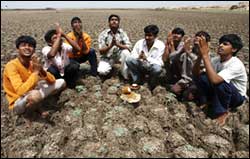 | « Back to article | Print this article |
The recent arrest of a suspected Laskhar-e-Tayiba operative from Nalgonda, Andhra Pradesh, in connection with the terrorist attack on the Indian Institute of Science in Bangalore holds a lesson for the country: That Andhra Pradesh may swiftly becoming jihad's production factory.
Just how deep is the problem? And why do terror touts find easy prey in the southern Indian state?
The first of a two-part investigation by Rediff India Abroad Managing Editor George Iype.
Andhra Pradesh has two faces.
One: The booming capital, Hyderabad, where global information technology firms compete to set up shop.
Two: Drought-stricken, backward district headquarter towns like Nalgonda, from where merchants of strife recruit young men to be trained as terrorists.
"Where is the boom in Andhra Pradesh?" asks K Narayan Reddy, a social activist in Nalgonda who works among thousands of people affected by excess fluoride in ground water.
The fluoride has harmed at least 10,000 people across Nalgonda district, who suffer from bone disease, hunched backs, warped teeth and blindness.
Reddy believes Andhra Pradesh presents the best example of lopsided development, and that is one reason why the state offers a soft  target for Pakistan's Inter-Services Intelligence, which aims to destabilise India by nurturing terrorism.
target for Pakistan's Inter-Services Intelligence, which aims to destabilise India by nurturing terrorism.
"Do you know the drought prompts the youngsters to become militants," he says.
Image: Youngsters pray for rain at the dried up Osmansagar lake in Hyderabad.
How is the drought breeding militancy in a district like Nalgonda, which is located about 100 km away from the state capital? For the answer, ask Venepalli Panduranga Rao, a village chieftain in Alagapada, Nalgonda district.
Hyderabad: The next terror target?
"Youngsters here have no jobs, and some of them may be falling prey to the designs of fundamentalist groups," he says.
Soon after Razi-Ur-Rehman alias Abdul Rehman's arrest in connection with the IISc attack in Bangalore, at least two dozen youngsters from Nalgonda went underground, the police say.
Intelligence agencies suspect the youngsters may have been trained at terrorist camps in Pakistan or Bangladesh, and were working towards attacks like the assault on the IISc.
The police say towns like Nalgonda, Warangal and Mahboobnagar in Andhra Pradesh are home to men like Rehman, who are agents of various militants groups aided by the ISI.
Sample these snapshots, revealed by Intelligence Bureau agents and the Andhra Pradesh police:
A senior police officer in Nalgonda says whenever there is a major terrorist attack in Jammu and Kashmir, its after-effect is instantly felt in this town, thousands of kilometres away.
B Raman: Why terrorists struck Bangalore
"We regularly seize audio cassettes with anti-India speeches and pamphlets, which are circulated after terror attacks in Kashmir," the police officer reveals.
It was in Nalgonda that farmers once led an armed struggle for a separate Telangana state. The struggle for a separate Telengana state continues.
Activists and healthcare volunteers say the drought, that has affected Nalgonda district over the years, has had a devastating effect on marginalised sections of the population like agricultural labourers, rural artisans and tribals.
And that discontent could provide the soil for fundamentalist elements to germinate.
"People, especially the youngsters, are fed up of living here," says Murli Raghavan of the Health Care Foundation Society, a Hyderabad-based non governmental organisation, which works in rural healthcare.
"There is dangerously high fluoride content in groundwater, and someone in every family suffers from one health problem or the other. The youth who have no other avenues in life are easy prey for dubious groups and agencies," he says.
Nalgonda district has a population of 3.5 million, he says, of which 2.8 million live in the drought-affected rural areas.
"Everyone says Hyderabad is growing to be an international city, but towns and districts like Nalgonda are growing more backward every year," adds Raghavan.
Why South India is a jihadi target
Observers like Raghavan and police officers say Nalgonda's link with fundamentalism is not new.
It is, they claim, part of a destabilisation plan that the ISI and various Kashmir terrorist groups have activated in the south Indian state.
Don't miss the second part of this investigation, where it is revealed that the ISI has been working patiently in Andhra Pradesh for decades.
Photograph: Getty Images